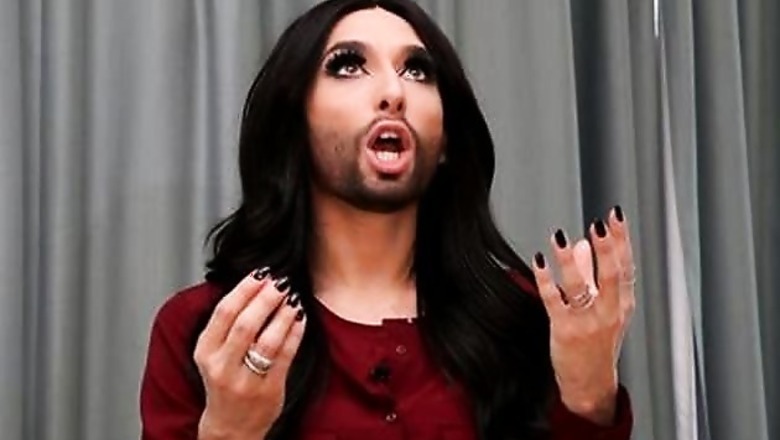
views
Vienna: Long legs crossed, one leopard-skin patterned spike heel dangling, the bearded diva with the expressive brown eyes leans back and laughs heartily when asked what has changed for her since winning Europe's biggest entertainment contest nearly a year ago.
"I'm living my dream," Conchita Wurst told The Associated Press in an interview. "Everything fell into the right place for me."
Everything may be a big word. But for the drag queen, whose journey of self-discovery took her from bigoted small-town Austria to her emotional victory at the 2014 Eurovision song contest, the last 10 months appear to have confirmed that her path - though not always easy - was the right one.
She rubs shoulders with fashion icons Jean-Paul Gaultier and Karl-Lagerfeld and plays sold-out gigs across Europe. Her appearances on Austrian radio talk shows attract callers from as far away as California.
U.N. Secretary General Ban Ki-moon has paid his respects. She has addressed the European Parliament on LGBT rights, and her biography has just appeared in German, with other languages to follow.
Less than a year ago, over 15,000 Russians demanded that their state broadcaster purge the contest from its programming because of Wurst, accusing "European liberals" of subjecting their children to a "hotbed of sodomy."
The haters still exist - but Wurst says there is also a growing group of "incredible" Russian fans pushing to have her biography published in Russia.
"I made the decision years ago not to focus on negativity," she said. And since the win, "many people have told me that they have changed their mind about me - they got inspired, which is just overwhelming for me."
Her fuchsia-colored blouse and green skirt perfectly accenting her makeup, Wurst looked as if she were never anyone else than the persona that has made her famous.
But even if she says that she is now immune to hate, that wasn't always so.
Born 25 years ago to innkeepers as Tom Neuwirth, Wurst was raised in the sleepy Austrian town of Bad Mittendorf, where conservative values were the norm - not a very comfortable place for someone who was different even as a child.
"I was constantly stressed, the target of the derisive glances of my school mates and their taunting," she recounts in the book "Ich, Conchita." ("I Conchita.") Visits to the school toilet turned into nightmares with classmates seeking to find out "if the queer looks different." And "each morning when I thought of school, my stomach wanted to turn."
Wurst came out at 17. But instead of bringing release, the declaration backfired with her family - at least initially.
After several performances brought her some local fame, she was asked by a reporter for a weekly if she was gay. Suddenly she realized that she had to stop lying to herself and those closest to her.
Yes, she blurted out. Then "I went home to my parents, and said, `listen, I'm gay.'"
Wurst's parents might well have suspected her sexual orientation - she loved dressing up in women's clothes since childhood. Still she says that for them, the shock was "not the fact that I'm gay but (that) a week later a newspaper will come out and everybody will know it," including the conservative clientele frequenting her parents' inn.
Eight years on, she calls that moment "one of the most important of my life ... that second where I chose to be myself 100 percent."
Her name is a play on the Austrian expression "it's wurst to me," meaning "I don't care." And her winning song "Rise Like a Phoenix" largely describes her transformation from a youth hurting under the taunts of peers to someone who now says she is totally comfortable being both Wurst and Neuwirth.
Still, she cautions others to think hard about when, and how to follow her example.
"Just take your time," she said in near-flawless English.




















Comments
0 comment